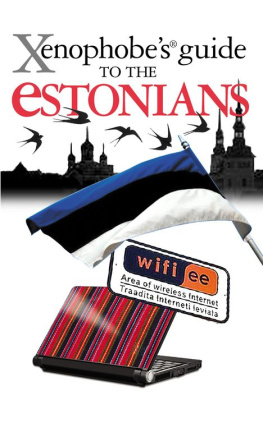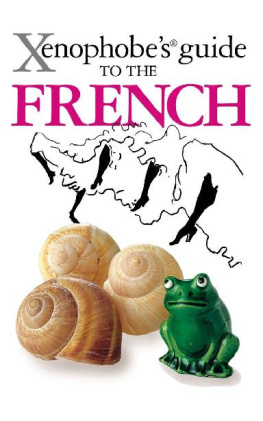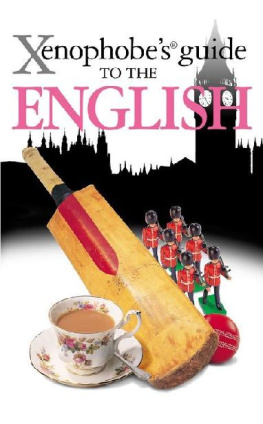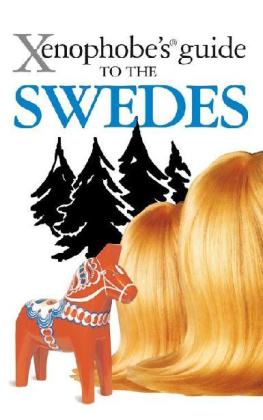Christine Cole Catley - The Xenophobes Guide to the Kiwis
Here you can read online Christine Cole Catley - The Xenophobes Guide to the Kiwis full text of the book (entire story) in english for free. Download pdf and epub, get meaning, cover and reviews about this ebook. City: London, year: 2006, publisher: Oval Projects, genre: Home and family. Description of the work, (preface) as well as reviews are available. Best literature library LitArk.com created for fans of good reading and offers a wide selection of genres:
Romance novel
Science fiction
Adventure
Detective
Science
History
Home and family
Prose
Art
Politics
Computer
Non-fiction
Religion
Business
Children
Humor
Choose a favorite category and find really read worthwhile books. Enjoy immersion in the world of imagination, feel the emotions of the characters or learn something new for yourself, make an fascinating discovery.
- Book:The Xenophobes Guide to the Kiwis
- Author:
- Publisher:Oval Projects
- Genre:
- Year:2006
- City:London
- Rating:4 / 5
- Favourites:Add to favourites
- Your mark:
- 80
- 1
- 2
- 3
- 4
- 5
The Xenophobes Guide to the Kiwis: summary, description and annotation
We offer to read an annotation, description, summary or preface (depends on what the author of the book "The Xenophobes Guide to the Kiwis" wrote himself). If you haven't found the necessary information about the book — write in the comments, we will try to find it.
The Xenophobes Guide to the Kiwis — read online for free the complete book (whole text) full work
Below is the text of the book, divided by pages. System saving the place of the last page read, allows you to conveniently read the book "The Xenophobes Guide to the Kiwis" online for free, without having to search again every time where you left off. Put a bookmark, and you can go to the page where you finished reading at any time.
Font size:
Interval:
Bookmark:


The Kiwi population is around 4.3 million, compared with 21 million Aussies, 52 million English, 127 million Japanese, 242 million Indonesians and 307 million Americans.
New Zealand is more than twice the size of England and as big as Italy without the toe but could fit into Australia 28 times.
Gods own country Godzone is how Kiwis see New Zealand. They live in a land of unsurpassed natural beauty, friendly welcomes, fair play for one and all, and happily ever afters.
A quick chat with a passing Kiwi on any New Zealand street can very quickly turn into an invitation to dinner or a weekend stay in the spare room.
Give Kiwis half a chance and they will go out of their way to prove it to you. Indeed, visitors to New Zealand (or as Kiwis pronounce it, New Zild) can expect to be constantly set upon by the insatiably hospitable locals. A quick chat with a passing Kiwi on any New Zealand street can very quickly turn into an invitation to dinner, a weekend stay in the spare room or an extended guided tour of the local sights. Kiwis are fiercely proud of their country and love nothing better than to show it off.
So heaven help the visitors who criticise Godzone, especially if they come from the original European seedbeds England, Scotland, Wales, or Ireland and therefore should know better. Only the Australian visitor is given leeway to criticise. Kiwi-bashing, for some reason that escapes the Kiwis, is a favourite Aussie pastime. In fact, youre about as likely to come across an Aussie wholl admit to having good feelings for the Kiwis as of finding a decent Australian beer.
Self-deprecation is wired deeply into the national psyche, so praise is always looked upon with suspicion.
Kiwis love receiving praise about their country. However, self-deprecation is wired deeply into the national psyche, so praise is always looked upon with suspicion. Kiwis constantly fear that they are being buttered up, or somebody is having them on. In keeping with this schizophrenic aspect of the national character, both praise and criticism are reported by the media, and are hotly debated. When English critic and columnist Bernard Levin devoted two columns in The Times to the incomparable beauties of New Zealand, this could not go unchallenged. During prime-time news on New Zealands most popular television channel a reporter telephoned Levin and quoted to him his own words: The loveliest country in the world? Levin: Yes, yes. But do you really mean it? Levin: Of course. Yes, but really ?
Travellers must therefore tread a delicate course, at first ladling out praise about New Zealand to allow the beaming local to demur, but then being willing to smile indulgently as he or she swiftly counters with a list of the countrys faults. New Zealand may be Godzone, but no self-respecting Kiwi would wish to get too carried away in talking it up.
The Kiwis know they take rather more interest in other countries than those in other countries take in them. This grieves them a little though they say politely that its a natural consequence of being few in number, and living at the bottom of the map.
In fact, Kiwis enjoy nothing more than a chance to educate those who live under a cloud of ignorance concerning their country. A common preoccupation of Kiwis abroad is watching out for their nations name in their host countrys newspapers. Any mention is pounced on, even if, as is most likely, it concerns a natural disaster or is confined to the sports pages.
A common preoccupation of Kiwis abroad is watching out for their nations name in their host countrys newspapers.
Still, Kiwis are quick to remind others about their country s successes. Conversations with them are often studded with references to the deeds of their famous fellows. Outside the world of sport, there are four nationals few would question as being well-known abroad: mountaineer Edmund Hillary, writer Katherine Mansfield, nuclear scientist Ernest Rutherford, and opera singer Kiri Te Kanawa.
This is thought to be an absurdly short list in view of New Zealands overall contribution to the world. So expect other candidates of praiseworthy deeds to be casually dropped into conversations, such as Godfrey Bowen, once the worlds fastest sheep shearer; William Atack, the first man to use a whistle to stop a sports fixture, and Ernest Godward, inventor of the spiral hairpin. For just about any category of event or exploit, Kiwis will be able to come up with the name of a countryman or woman who deserves mention.
Kiwis want everyone to know that New Zild is not just a source of naturally springy wool.
Kiwis would like to be seen as people of consequence living in a country with much to offer the rest of the world. They want everyone to know that New Zild is not just a source of naturally springy wool (used, by the way, to make championship tennis balls and award-winning fashion by designers like Karen Walker, whos a Kiwi, in case you didnt know). As a first step they wish the rest of the world would learn just where they are on the globe, and colour it clean green.
They would prefer to believe that the worlds ignorance of many matters concerning New Zealand is merely due to the fact that other countries have not achieved their degree of cultivation. Its a belief often reinforced by visitors who touch down at Auckland airport thinking that the next leg of their tour will be a bus ride to Sydney.
Friendly is the adjective which crops up most in surveys about how others see the Kiwis. Except in the surveys taken by the Aussies, that is. The Aussies see the Kiwis as a bit stodgy and generally behind the times. Kiwis understand that these jibes are simply a product of envy, or sunstroke.
Ironically for a people who take their widely-used moniker from a timid, flightless bird, Kiwis are ardent travellers.
Ironically for a people who take their widely-used moniker from a timid, flightless bird, Kiwis are ardent travellers. There are more passports in New Zealand for each million people than in any other country in the world, and they get plenty of use. Kiwis can be found propping up bars and setting up camp near rugby stadiums around the globe. Overseas, Kiwis are usually sought after, whether as team leaders, nannies or for any other job requiring stamina, resilience, and versatility. Kiwis have to be versatile. There really arent enough of them for there to be specialists.
For years the Kiwis suffered from reverse paranoia, the conviction that everyone who counted was out to be nice to them. This did not surprise them. They knew that deep down they were good keen men and women, lovable even.
It isnt easy coping with unrequited love, and signs of republicanism are breaking through.
Their strongest bond was with Britain, the Mother Country, the Old Country, Home always expressed with capital letters. Kiwis were more thoroughly British than the British. What other country set up a Coronation Rejoicing Committee? Then Britain entered the European Community and ceased giving priority to New Zealands principal exports of butter, meat and wool. Worse, Kiwis travelling to the Mother Country had to join the Heathrow queues marked Aliens.
Despite such tribulations, a sizeable proportion of Kiwis still love Britain best. But it isnt easy, coping with unrequited love, and signs of republicanism keep breaking through. New Zealand no longer has the Privy Council in London as its highest appellate court, and the British honours system has been replaced by a Kiwi-only version.
Font size:
Interval:
Bookmark:
Similar books «The Xenophobes Guide to the Kiwis»
Look at similar books to The Xenophobes Guide to the Kiwis. We have selected literature similar in name and meaning in the hope of providing readers with more options to find new, interesting, not yet read works.
Discussion, reviews of the book The Xenophobes Guide to the Kiwis and just readers' own opinions. Leave your comments, write what you think about the work, its meaning or the main characters. Specify what exactly you liked and what you didn't like, and why you think so.













